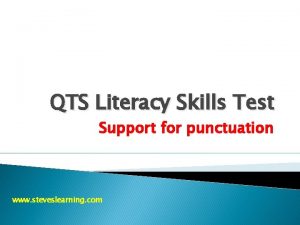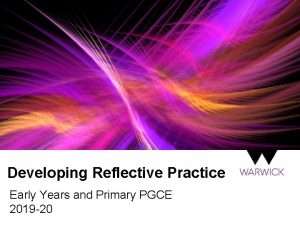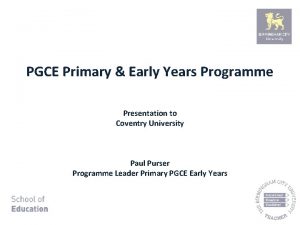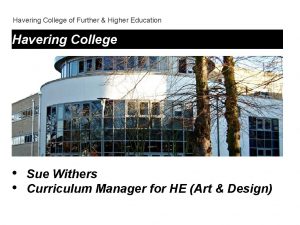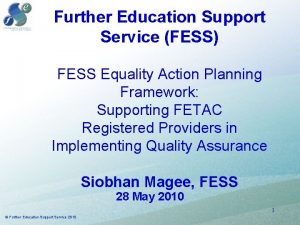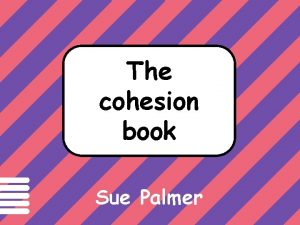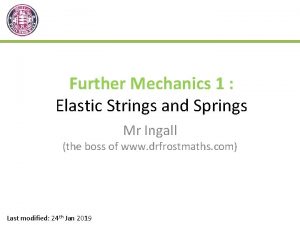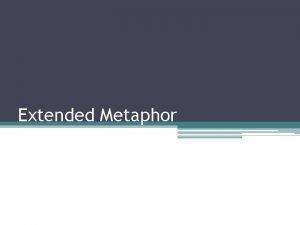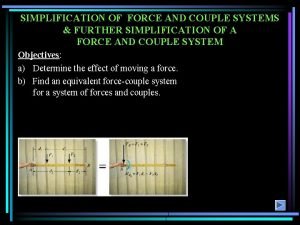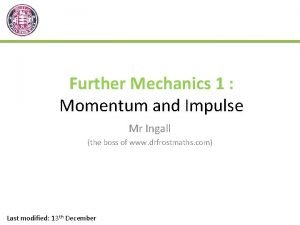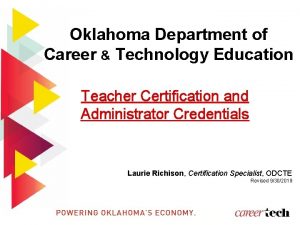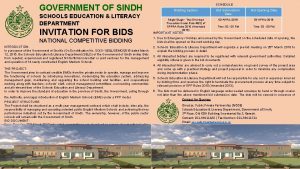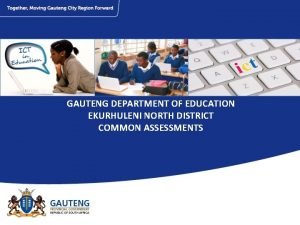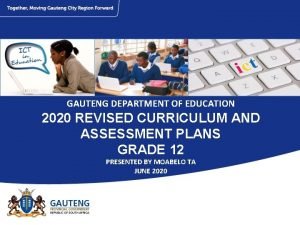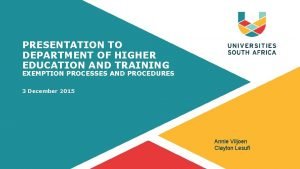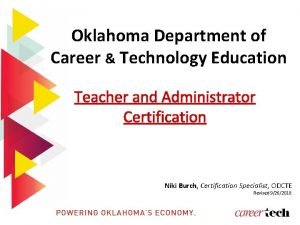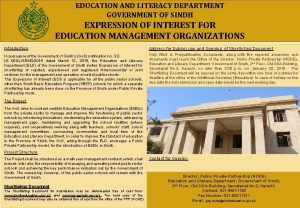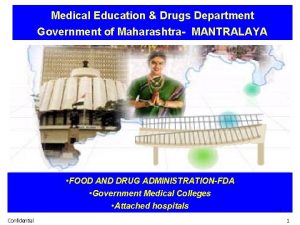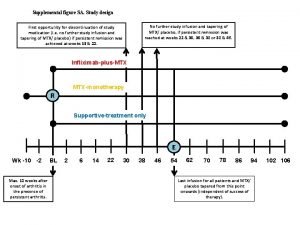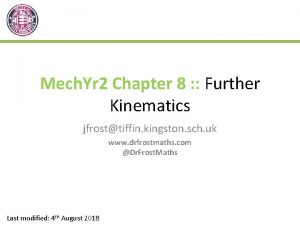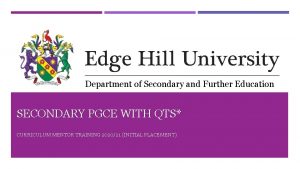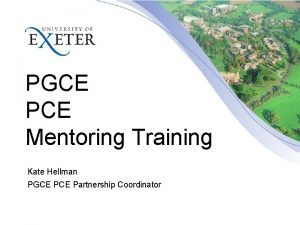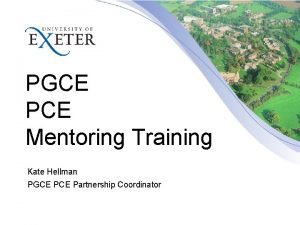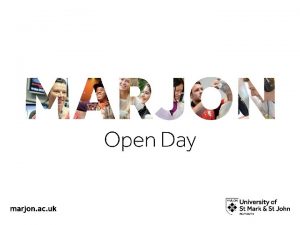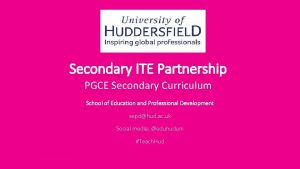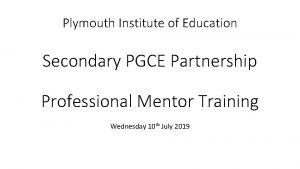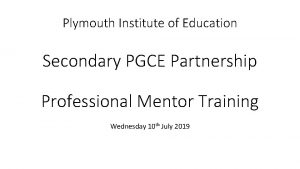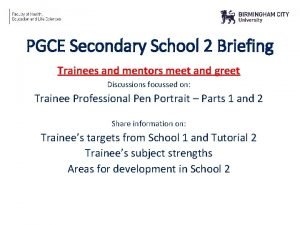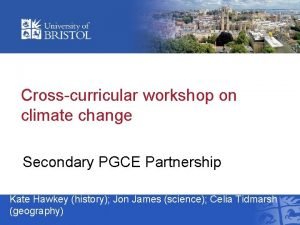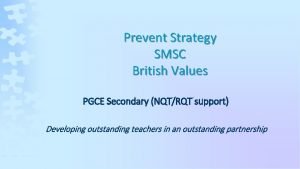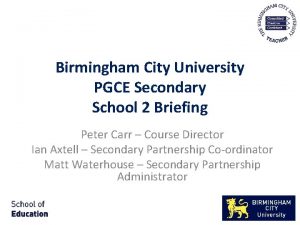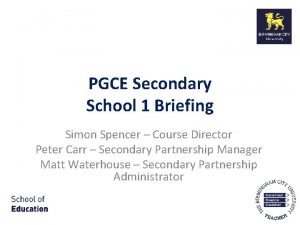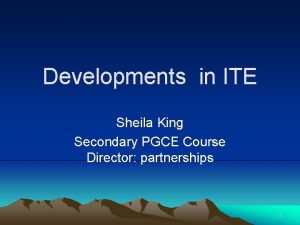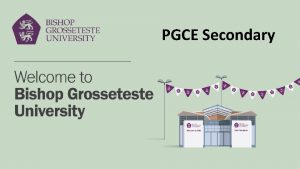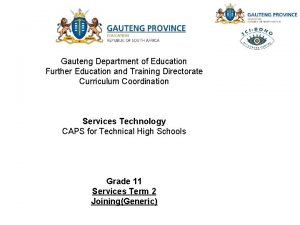Department of Secondary and Further Education SECONDARY PGCE





















- Slides: 21

Department of Secondary and Further Education SECONDARY PGCE WITH QTS* CURRICULUM MENTOR TRAINING 2020/21 (DEVELOPMENTAL/CONSOLIDATION PHYSICAL PLACEMENT)

WELCOME TO THE EDGE HILL SECONDARY PARTNERSHIP Many thanks for your offer to mentor a student teacher from Edge Hill. Our vision for ITT includes a strong partnership between the university and our partner school colleagues so that our student teachers are able to blend their theoretical learning with a practical application in the classroom. We also recognise the knowledge, skills and expertise which our school-based colleagues are able to offer to our Secondary ITT curriculum.

OUR GOAL FOR OUR STUDENT TEACHERS That every student teacher is fully prepared for a career in teaching by the end of their training, recognising that ITT is just the first stage of this. Their ITT provides a firm foundation for them to continue their development in line with the Early Career Framework (Df. E, 2019 a). That by the end of ITT our student teachers have reached a position where they are able to act as a full member of a teaching team, be selfdirective in their development, and to exercise resilience and academic buoyancy within a challenging environment.

OUR GOAL FOR OUR MENTORS That our school-based mentors are: § Valued for their input and support in developing a partnership. § Valued and supported in their role as mentors. § Developed professionally.

AIM: TO DEVELOP MENTOR SKILLS IN ORDER TO SUPPORT STUDENT TEACHER DEVELOPMENT By: 1. Identifying and reviewing the characteristics of a mentee 2. Identifying and reviewing the characteristics of a mentor 3. Reviewing the stages of development of a student teacher within the timeframe of a PGCE 4. Familiarisation with ITT Core Content (Df. E, 2019 b) 5. Investigating how the mentor’s role adapts according to the development of a student teacher

WHY IS HIGH QUALITY MENTORING SO IMPORTANT? Supports and develops fundamental professional and personal skills Enables a successful transition throughout ITT and into the early stages of a career Contributes to the development of student teacher’s professional identity (Izadina, 2015) Can help trainee professionals to develop the necessary skills and resiliency to navigate the rough seas of a profession which may be ‘toxic’ at times (Palmer, 2010) Model good practice Creates networks and partnerships for further development and support

WHO’S WHO WITH PLACEMENT? Course Leader: In Secondary PGCE, each of the separate subjects are led by a Course Leader. They have overall responsibility for all aspects of their course. Contact details for all CLs can be found at the end of this presentation. Visiting Tutor: Each student teacher is assigned a VT who has responsibility for them whilst they are on placement. In some cases, the VT may also be the CL, but this is not always the case, especially on larger courses. The VT acts as the link between the student teacher, the mentor and the CL. Curriculum Mentor: Each student teacher is assigned a CM from their placement. This is a member of staff from within that subject area who takes responsibility for them during their placement. CM works in partnership with the VT and the student teacher (and in some cases also the CL). Professional Mentor: Within each school there is a PM. Often a member of SLT, they have overall responsibility for all student teachers within their setting. PMs often have more contact with the Secondary partnership team, rather than individual CLs or VTs. Partnership Quality Officer: PQOs support the work of the partnership team in quality assuring the experiences of student teachers whilst on placement. They are often involved with training CMs/PM’s and work with everyone involved in the placement. Each PQO has responsibility for a number of schools within a certain area.

NO-ONE WANTS A MENTEE WHO… v Is only being mentored because he thinks it is what is expected; v Never really thinks about her professional practice and what works; v Thinks that she can suck her mentor dry of all their tips and tricks rather than develop their own approaches; v Cannot be bothered to think carefully before a mentoring session about what he wants to get out of it; v Sees asking for help as a sign of failure or weakness; v Acts the helpless victim who just wants to be given the ‘answer’. (Gravells, 2017)

WHAT MAKES A GOOD MENTOR? • • Key recommendation from Carter ITT Review Non-statutory standards developed to help bring greater coherence and consistency to the school-based mentoring arrangements for trainee teachers National Standards for ITT mentors (2016) The mentor should: Standard 1: Personal Qualities Be approachable and make time for the student teacher. Establish trusting relationship built on professional respect and honesty, model high standards or practice, empathise with the challenges they face and support them in developing reflective skills to improve their practice. Standard 2: Teaching Support student teacher to develop their teaching practice in order to set high expectations and to meet the needs of all pupils. Standard 3: Professionalism Induct the student teacher into the professional norms and values of the profession (inc. wider life of school), help them to understand the importance of the role and responsibilities of teachers in society. Standard 4: Self development and working in partnership Continue to develop their own professional knowledge, skills and understanding and invest time in developing a good working relationship with the ITT partnership. TEACHNG SCHOOLS COUNCIL, (2016), National Standards for school-based initial teacher training (ITT) men

NO-ONE WANTS A MENTOR WHO… Loves nothing more than to talk about themselves and their accomplishments; Believes that they have learned pretty much all they need to know; Believes there is generally one right way of doing things; Believes that there is generally one right way to do things in that school; Wouldn’t want to risk upsetting a colleague by giving them negative feedback; Wants to ‘give back’ by sharing all their wisdom; Gets embarrassed when the mentee talks about their feelings. (Gravells, 2017) • Only interested in the mentee ‘teaching by proxy’ rather than developing the mentees own identity and style (Roberts and Graham, 2008)

WHAT JOURNEY HAVE OUR STUDENT TEACHERS ALREADY BEEN ON? October 2019: Applications for 2020 cohort open and begin to be processed by admissions and course staff. we What … or f k o o l November 2019 -August 2020: Applicants are short listed and if successful, are invited to a formal interview at Edge Hill (some attend in Belfast). A significant proportion interviewed online. • A written task to assess their use of English & SPAG • A task to demonstrate their subject knowledge • A formal interview Successful applicants are offered a conditional place • Does the applicant have the potential to be a successful teacher? If successful: successful Applicants offered a place dependent upon conditions • BA (Hons) 2: 2+ • GCSE Maths & English • School experience (not essential) • Subject Knowledge Enhancement course (some courses) • Medical • DBS clearance August 2020: SKE courses for those applicants without necessary subject knowledge (condition of offer). Some will undertake SKE alongside their pgce. September. November: Hybrid teaching starts (mixture of online and Present in Person teaching) November. December 2020 Professional Practice 1 (PP 1) begins. For most this is a Virtual Placement (VP) January 2021 Professional Practice 2 (PP 2) begins With the right support and experience, does the applicant have the potential to be a successful teacher?

THE ITT CORE CONTENT FRAMEWORK (DFE, 2019 B) The curriculum delivered to our student teachers is underpinned by the ITT Core Content Framework. Designed to support trainee development in 5 core areas – behaviour management, pedagogy, curriculum, assessment and professional behaviours. Structured around a framework which draws on the Teachers’ Standards: High Expectations (TS 1) How pupils learn (TS 2) Subject & curriculum knowledge (TS 3) Classroom practice (TS 4) Adaptive teaching (TS 5) Managing behaviour (TS 7) Assessment (TS 6) Professional Behaviours (TS 8) ‘The quality of teaching is the single most important inschool factor in improving outcomes for pupils – and it is particularly important for pupils from disadvantaged backgrounds. No one is born a great teacher. Great teachers continuously improve over time, benefitting from the mentoring of expert colleagues and a structured introduction to the core body of knowledge, skills and behaviours that define great teaching’. (Df. E, 2019)

WHAT LEARNING HAVE OUR STUDENT TEACHERS ALREADY HAD? Generic (SRP 4001) Teachers and the Law An introduction to safeguarding Diversity, inclusion and protected characteristics Supporting trainee and pupil mental health and well-being Sex and Relationship education Metacognition Applying behaviour management theory in In addition to the generic modules, our student teachers may also have had learning which includes: The place and purpose of their subject in the current Secondary curriculum Subject specific pedagogies and concepts How pupils’ learn An introduction to planning An introduction to effective planning structures (e. g. Accelerated Learning Cycle, Teaching Backwards) the classroom All student teachers have also had a PP 1 experience. For many this was a VP. Some were able to physically attend their setting (mainly PE and those outside of England).

WHAT EXPERIENCE HAVE OUR STUDENT TEACHERS ALREADY HAD? Due to the global pandemic, the majority of PGCE student teachers undertook a VP for their PP 1 experience. This took the form of a virtual initial professional practice in which students were part of a small group, attached to a named school for a six-week period. A series of pre-defined investigative tasks to learn about the school as a learning community, the context within which it sits, the role of a teacher, and the position of a student’s specialist subject within the school curriculum Students being provided with a rich understanding of the social context within which a school operates and the challenges this may present The use of the school website as a vehicle for getting to know and understand the values of a school – policies into practice An insight into the curriculum a school offers its pupils, particularly looking at the development of schemata and notions of progression and sequencing in a variety of subject areas A series of directed tasks which unpick key themes and support a student to be able to assess and design a series of teaching materials which meet the identified needs of learners within the student’s subject specialism Generic sessions delivered by the university and key partnership colleagues using the virtual learning environment The opportunity to be part of a group of students attached to the school who meet virtually as a community of practice to share findings, reflect, and talk about what they have noticed/learnt

KEY FEATURES OF A PHYSICAL PLACEMENT Over the course of their physical placement, student teachers should have experience of: Observing good practice (both in their subject and other related subjects) Supporting learners (individually and in small-groups) Over time, moving from planning and delivering parts of lessons (starter/hook/plenary etc) to taking greater responsibility for whole/solo lessons (up to 14 -15 hours per week, approx. 70% of a NQT timetable). Increasing responsibility for learner progress (individual and whole class) Receiving regular and formative feedback to aid their development. Contributing to the wider life of the school (e. g. Pastoral, duties, attendance at meetings, extra curricular etc)

HOW CAN MENTORS SUPPORT STUDENT TEACHERS ON PP 2? Provide formative feedback and guidance on the student teacher’s development and progress. Assist the student teacher in setting developmental targets and encouraging them to be proactive in meeting these targets. Model good practice (both subject specific and general T&L) Liaise with the VT and student teacher with regards progress and development of the student teacher. Allow student teacher’s access to subject-specific documentation/policies (such as SOWs, resources etc) and examples of good practice. Meet with the student teacher on a weekly basis to discuss key issues, set targets and review progress.

REVIEWING THE STAGES OF DEVELOPMENT FROM THE VIEWPOINT OF THE STUDENT TEACHER PP 2: Developmental & Consolidation (20 weeks) • Steady increase to 50% timetable (9/10 hours teaching per week) then 70% (14/15 hours p/w) • 20 weeks of continuous development • Student teacher becomes increasingly comfortable with planning for each of their groups, taking increasing responsibility for learners progress and learning of groups over time. PP 1: Initial (6 weeks) • May be wholly virtual or a physical (hybrid) placement • Familiarisation with school policies, the wider life of the school • Some experience of supporting/developing learners and/or learning materials

REVIEWING THE STAGES OF DEVELOPMENT FROM THE VIEWPOINT OF THE MENTOR (FURLONG & MAYNARD, 1996) Co-enquirer Critical Enquirer Coach Model

REFERENCES & FURTHER READING DFE (DEPARTMENT FOR EDUCATION), 2019 a-last update, Early Career Framework. Available: https: //assets. publishing. service. gov. uk/government/uploads/system/uploads/attachment_data/fi le/843676/Initial_teacher_training_core_content_framework. pdf. DFE (DEPARTMENT FOR EDUCATION), 2019 b-last update, Initial Teacher Training (ITT): Core content framework. Available: https: //www. gov. uk/government/publications/initial-teacher-training-itt-core-content -framework. GRAVELLS, J. (2017) Mentoring Getting it right in a week St Albans Critical Publishing PALMER, P. J. , 2007. A New Professional: The Aims of Education Revisited. Change: The Magazine of Higher Learning, 39(6), pp. 6 -12. ROBERTS, J. and GRAHAM, S. , 2008. Agency and conformity in school-based teacher training. Teaching and Teacher Education, 24(6), pp. 1401 -1412. TEACHING SCHOOLS COUNCIL, 2016. National Standards for school-based ITT mentors. Available: https: //assets. publishing. service. gov. uk/government/uploads/system/uploads/attachment_data/file/536891 /Mentor_standards_report_Final. pdf

CONTACT DETAILS Name Role Contact Dr Damien Shortt Head of Secondary and Further Education (Acting) shorttd@edgehill. ac. uk Natalie Reynolds Secondary PGCE English (CL) reynoldn@edgehill. ac. uk Martin Pickett Secondary PGCE Maths (CL) pickettm@edgehill. ac. uk Ben Porter Secondary PGCE Biology (CL) porterb@edgehill. ac. uk Sjay Patterson-Craven Secondary PGCE RE (CL) Sjay. Patterson@edgehill. ac. uk Rhonwen Bruce-Roberts Secondary PGCE History (CL) Rhonwen. Bruce-Roberts@edgehill. ac. uk Leon Fraser/Simon Dougherty Secondary PGCE PE (CL) fraserl@edgehill. ac. uk/doughers@edgehill. ac. uk Andy Watkins Secondary PGCE Geography (CL) watkinsa@edgehill. ac. uk Carl Simmons Secondary PGCE IT & Computer Science simmonc@edgehill. ac. uk (CL) Secondary Partnership team Secondary & FET support team SFEsupportteam@edgehill. ac. uk

GLOSSARY Core content: ITT Content set by Df. E (2019) and which underpins all ITT delivery. Links to the Early Career Framework. Course Leader: Individual with overall responsibility for each subject specific course (e. g. Secondary PGCE English). May also act as VT for specific student teachers. Curriculum Mentor: School-based mentor. Works in partnership with the VT and the student teacher (and in some cases also the CL). ITT: Initial Teacher Training PGCE: Post Graduate Certificate in Education Professional Mentor: Often a member of SLT, they have overall responsibility for all student teachers within their setting. PMs often have more contact with the Secondary partnership team, rather than individual CLs or VTs. Professional Practice: School-based placement. This may be virtual (VP) or physical. Partnership Quality Officer: Members of the partnership team who support and quality assuring student teachers experiences on placement. Each PQO has responsibility for a number of schools within a certain area. PP 1: Professional Practice 1 (can also be referred to as initial PP) PP 2: Professional Practice 2 (may also be referred to as developmental and/or consolidation PP) Student Teacher: Post Graduate (PGCE)/ITT trainee Visiting Tutor: Tutor from Edge Hill who has responsibility for individual student teacher whilst on PP. Works in partnership with CM and student teacher. In some instances, the VT may also be the CL. VP: Virtual Placement. A virtual initial professional practice in which a student is part of a small group of students ‘virtually’ attached to a named school for a six-week period.
 Pgce skills test
Pgce skills test Pgce reflective journal examples
Pgce reflective journal examples Uwe pgce
Uwe pgce Pgce early years
Pgce early years Havering college of further and higher education
Havering college of further and higher education Further education support service
Further education support service Cohesion
Cohesion Further mechanics elastic strings and springs
Further mechanics elastic strings and springs Life is a highway metaphor
Life is a highway metaphor Further simplification of a force and couple system
Further simplification of a force and couple system Further mechanics 1 unit test 1 momentum and impulse
Further mechanics 1 unit test 1 momentum and impulse Oklahoma department of career and technology education
Oklahoma department of career and technology education Sindh education and literacy department
Sindh education and literacy department Gde ekurhuleni north district
Gde ekurhuleni north district Gde vision and mission 2021
Gde vision and mission 2021 Department of higher education and training
Department of higher education and training Oklahoma department of career and technology education
Oklahoma department of career and technology education Education and literacy department
Education and literacy department Medical education and drugs department
Medical education and drugs department Further study design
Further study design Fantail of ship
Fantail of ship Dr frost further kinematics
Dr frost further kinematics
